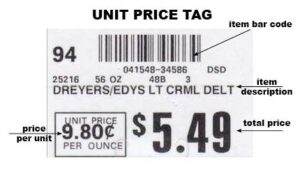
By Stacy Pelletier, Registered Dietitian
Nutrition plays a large role in both our physical and mental health. With the high cost of food, eating right when money is tight can sometimes feel like a challenge. Here are some tips you can use to help save money and improve your health at the same time:
- Plan – Before heading to the grocery store plan your meals for the week. Use grocery store sale flyers and apps to plan meals that use ingredients that are on sale. Meat tends to be the most expensive food item, so look for what meats are on sale first. Figure out what ingredients you already have on hand and make a list of the items you need to buy. Clip coupons from flyers or apps before you go, and when you get to the grocery store, make sure to stick to your list.
- Buy in Bulk – Many healthy foods such as brown rice, whole grain pasta, beans, oats, nuts, canned tuna/salmon, spices, etc. have a long shelf life and are cheaper if you buy them in larger quantities. Consider stocking up on foods with a long shelf life when they go on sale.
- Eat Before You Go – Try to avoid shopping when you’re hungry. Most people spend significantly more money when they shop hungry and often purchase foods with lower nutritional value.
- Single Serve Snacks – Food packaged in individual servings often cost more than buying a larger container and portioning it out yourself. For example, try buying a large tub of yogurt instead of individual yogurt cups. Buy a large box of crackers and re-package into smaller containers when you get home.
- Use Unit Cost – Under each product you can find the unit price. Unit price tells you what the cost of the product is per ounce, pound, etc. Use this to compare different brands and different sizes of the same brand to determine which is the best deal. Generic or store brands tend to be the least expensive.
 Rethink Your Drink – Drink water instead of purchasing soda and other high sugar beverages. Use reusable water bottles to avoid having to buy water at the store.
Rethink Your Drink – Drink water instead of purchasing soda and other high sugar beverages. Use reusable water bottles to avoid having to buy water at the store.- Get Cooking – Convenience foods like pre-cut fruits/veggies, frozen dinners, and to go meals will save you time, but cost you more. Try cooking on your days off to make it easier to eat well on busy work days.
- Buy In Season – Buying fruits and veggies when they’re in season will usually cost less and they often taste better. Frozen and canned fruits and veggies are a great option as well. Frozen fruits and vegetables are packaged at their peak ripeness and maintain their nutrition value in the freezer. When buying canned fruits look for fruit canned in water or 100% fruit juice. When buying canned vegetables look for low sodium options.
- Eating Out – Restaurants are often expensive. You can save money by taking advantage of early bird specials, eating out for lunch instead of dinner, avoiding alcohol, drinking water, and looking for weekly deals; for example, 2 for 1 special certain nights of the week.
- Meatless Meals – Consider swapping out meat for other lower cost, healthy protein options like beans, lentils, tofu, peanut butter, low fat cottage cheese, and eggs.
- Get Gardening – Try growing your own fruits, vegetables, and herbs and then freezing or canning any extra that you have. You could consider a container garden or planting herbs in your windowsill if you have limited space!
Stacy Pelletier, Registered Dietitian, specializes in nutrition and dietetics. She enjoys working with our geriatric populations in the acute and long-term care setting. Stacy shares that helping her patients and their families achieve their individual health goals and improve quality of life is very rewarding. A graduate of the University of Rhode Island, Stacy joined the Gifford team in 2007.
Additional Resources
- Seasonal Produce Guide – https://snaped.fns.usda.gov/seasonal-produce-guide
- Healthy and Thrifty Recipes- https://snaped.fns.usda.gov/nutrition-education/snap-ed-recipes
- Meal Planning- https://www.myplate.gov/eat-healthy/healthy-eating-budget

